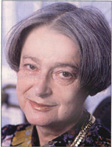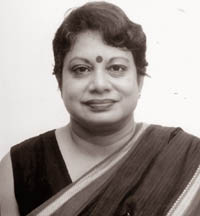Personne et discrimination: perspectives historiques et comparées de Marie Mercat-Bruns, Valérie Doumeng et Jean-François Niort
Objet : Colloque de lancement de livre
Lieu : Faculté de droit de l'Université McGill, salle à confirmer
Date : mardi 27 juin 2006, de 9 h à 12 h
Le Centre de recherche en droit privé et comparé du Québec et le Centre sur les droits de la personne et le pluralisme juridique vous invitent au colloque de lancement du livre Personne et discrimination: perspectives historiques et comparées, paru en janvier chez Dalloz sous la direction de Marie Mercat-Bruns, maître de conférences à la chaire de droit social du CNAM de Paris.
Intervenants:
- Marie Mercat-Bruns, Chaire de droit social, CNAM, Paris
- Marie-France Bureau, Université McGill, Montréal
- Valérie Doumeng, Université de la Guyanne française, Guadeloupe
- Jean-François Niort, Université de la Guyanne française, Guadeloupe
La citoyenneté et la diversité
Conférencier: Dominique Schnapper
Date: lundi 29 mai 2006 à 11 h
Lieu: 3660 Peel, Common Room

Dans sa réflexion sur « la problématique de la citoyenneté et de la diversité » dans les États pluriculturels comme la France et le Canada, Dominique Schnapper puisera dans son expérience de l’administration publique. Son expérience de la vie et le fruit de ses recherches semblent prouver à ses yeux que la citoyenneté est aussi un principe de gestion de la diversité. Selon madame Schnapper, le problème se pose de savoir si la citoyenneté peut transcender toutes les formes de diversité. En d'autres termes, elle se demande s'il existe des limites aux diversités compatibles avec les principes démocratiques.
Lors de la conférence, elle s'efforcera d'analyser le sens de ces limites.
Colloque de l'ACFAS : les droits de la personne et le pluralisme juridique
74e Congès de l'ACFAS «Le savoir : trame de la modernité»
mercredi 17 mai, 2006
Personne responsable : Colleen Sheppard
Point de ralliement : Université McGill (dans la continuité de l’Avenue McGill College, derrière le Portail Roddick, qui donne face à la rue Sherbrooke)
Les concepts de droits de la personne, de plus en plus appliqués dans divers contextes sociaux et culturels, sont le reflet d’un monde juridiquement pluriel, dont la pluralité inspire de nouvelles idées sur les relations entre le droit et la société. À cet effet, il est non seulement important d’ analyser le droit dans son contexte social, philosophique, éthique et historique, mais il est également essentiel d’explorer les interfaces existant entre les droits de la personne et les nombreuses normes collectives, institutionnelles et culturelles. Associer l’étude des droits de la personne au pluralisme juridique permet de mettre en lumière l’importance des multiples ordres juridiques et normatifs, les investigations éthiques, les savoirs locaux, les relations individuelles et systémiques ainsi que le pouvoir social dans les institutions et les communautés (de la société) civile(s). Ce colloque comprend deux sessions. La première adressera de multiples conceptualisations du pluralisme juridique et ses significations potentielles pour le respect de la dignité humaine dans les contextes institutionnels pluriels de la vie quotidienne. La seconde session s’ orientera vers des problématiques parallèles, mais concernant les droits de la personne dans des situations de conflit armé.
LE PLURALISME JURIDIQUE, LES DROITS DE LA PERSONNE ET LE DROIT AU QUOTIDIEN
13h00 – 15h00
Présidente : Colleen Sheppard, Directrice de recherche, Centre sur les droits de la personne et le pluralisme juridique, Faculté de droit, Université McGill
Jean Guy Belley, Directeur, Centre de recherche en droit privé et comparé du Québec, Faculté de droit, Université McGill
Guylaine Vallée, École de relations industrielles, Université de Montréal
Julie DesRosiers, Faculté de droit, Université Laval
LE PLURALISME JURIDIQUE ET LES DROITS DE LA PERSONNE DANS LES SITUATIONS DE CONFLIT ARMÉ
15h15 – 17h00
Président : François Crépeau, Directeur scientifique, Centre d’études et de recherche internationales de l’ Université de Montréal (CÉRIUM)
René Provost, Directeur, Centre sur les droits de la personne et le pluralisme juridique, Faculté de droit, Université McGill
Anne Saris, Professeure adjointe, Université du Québec à Montréal
Peter Leuprecht, Directeur, l’Institut d'études internationales de Montréal (IEIM), l’ Université de Québec à Montréal et Représentant spécial des Nations Unies pour les droits de l’homme au Cambodge
Speaking the Unspeakable: A Conversation with Survivors of Three Genocides
Host: Payam Akhavan
Speakers: Hédi Fried, Youk Chhang, & Esther Mujawayo
Date: April 7, 2006
What does it mean to survive genocide? How can life make sense in the aftermath of radical evil? Does human rights discourse adequately capture the gravity of such an experience? Is justice possible for the ultimate crime? Do we learn from history or is “never again” an empty promise?
These probing questions were discussed in an intimate conversation with three extraordinary persons:
- Hédi Fried is a Holocaust survivor who was interned at the Auschwitz and Bergen-Belsen camps as a child. She is an accomplished psychologist and human rights advocate in Sweden.
- Youk Chhang is a survivor of the 1975-79 Khmer Rouge genocide. He is the Director of the Cambodia Documentation Centre in Phnom Penh and has played a leading role in advocating accountability for Khmer Rouge crimes.
- Esther Mujawayo is a survivor of the 1994 genocide in Rwanda. She is the founder of the women’s support group Avega and author of both the remarkable memoir SurVivantes and La fleur de Stéphanie, about her search for truth following the killing of her sister and her entire family in 1994.
Following Orders: Lessons from Nuremberg for Soldiers and Children
Lecturer: Martha Minow
Convener: Colleen Sheppard
Date: March 9, 2006
Harvard University law professor Martha Minow explored the defense of “following orders” from a superior in relation to charges of war crimes, genocide, or crimes against humanity. The rejection of this defense is often traced to the Nuremberg Trials, where it was established that responsibility runs to the individual -- no one can be excused from responsibility for these most serious offenses on the grounds that he or she was following superior orders.
However, the reality of the rule both at Nuremberg and since is more complicated. Even if we were free of political preoccupations, devising a workable rule about superior orders would be very difficult. Several fields in psychology underscore obstacles to a workable rule teaching both military obedience and resistance to illegal orders. The stress of war and the special problems posed by the war on terror accentuate these obstacles.
Minow’s lecture explored the components of a workable rule and effective training while addressing how the problem of responsibility must be distributed, not placed only on the head of the individual soldiers.
Hybrid Courts in Context
Chair: René Provost
Collaborator: Société québécoise de droit international
Date: February 17, 2006
Full day conference on international criminal law, focusing on hybrid courts with jurisdiction over international crimes in Sierra Leone, Cambodia, East Timor, and Bosnia. Speakers included many high-level individuals having played an important role in these courts.
Welcome [.doc]
Panel 1 [.doc]: Taking Stock of Current Challenges facing Hybrid Courts
Chair: Valerie Oosterveld (U. of Western Ontario)
Panelists:
- David Crane (Former Prosecutor SCSL); Theme: Special Court for Sierra Leone
- Jan Kleffner (University of Amsterdam); Theme: East Timor Serious Crimes Panel
Panel 2 [.doc]: Taking Stock of Current Challenges facing Hybrid Courts (cont'd)
Chair: Ariane Brunet (Rights and Democracy)
Panelists:
- Peter Leuprecht (UQAM & UN SG Special Representative for Cambodia); Theme: Extraordinary Chamber for Khmer Rouge Crimes
- Stéphane Bourgon (ICTY defence counsel); Theme: Referrals to the Bosnian War Crimes Chamber
Panel 3 [.doc]: Relations with Other Entities
Chair: Luc Côté (former SCSL Chief of Prosecution)
Panelists:
- Richard Dicker (Director, International Justice Project, Human Rights Watch, NYC); Theme: Strategies for Burundi
- li>Frédéric Mégret (McGill); Theme; Theoretical Justification of Hybrid Courts, with a Focus on Iraq
- Caitlin Reiger (former legal officer, SCSL and In't Centre for Transitional justice, NYC); Theme: Contribution to Domestic Courts
Panel 4 [.doc]: Contribution to post-Conflict Reconciliation
Chair: Chile Eboe-Osuji (former ICTR prosecutor)
Panelists:
- Payam Akhavan (McGill & former prosecutor, ICTY); Theme: Potential and limits of international criminal law
- Bruce Broomhall (UQAM); Theme: Civil Society and Hybrid Courts
- Chandra Sriram (London); Theme: The SCSL and Society in SL
Conclusion [.doc]
Who is My Brother's Keeper?
Chairs: René Provost & Irwin Cotler
Date: December 1, 2005
In conjunction with the Visas for Life Exhibit, sponsored by Canadian Friends of Tel Aviv University, held at McLennan Library during November 2005.
A discussion of the legal and socio-historical perspectives relating to the role of diplomatic and governmental “rescuers” of Jews and other refugees during World War Two, and contemporary dilemmas where rules and laws may be bent or broken for humanitarian purposes.
Featuring:
Mr. Louis Philippe Mendes
Mr. Mendes will pay tribute to his grandfather, Portuguese Consul General Aristide de Sousa Mendes, who in Bordeaux, France in June, 1940 violated the instructions of Portugal’s government and issued 30,000 visas. As a result he was summarily dismissed, his career was ruined, and he died impoverished and disgraced.
Professor René Provost
Faculty of Law, McGill
Director of the Centre for Human Rights and Legal Pluralism
Professor Morton Weinfeld
Dept. of Sociology, McGill
Chair in Canadian Ethnic Studies
The Struggle for Human Rights - A Personal Story
Lecturer: Radhika Coomaraswamy
Chair: Micheline Senia
Date: November 8, 2005

Violence against women is a pervasive crime that is often hidden from the eyes of the law. Radhika Coomaraswamy has worked tirelessly in different parts of the world to demand that criminal justice systems acknowledge the hidden plight of women.
Radhika Coomaraswamy has earned degrees from Yale, Columbia and Harvard, and was deployed for nine years as an Independent Expert on Violence against Women for the United Nations. She has identified and held up to scrutiny three contexts in which women are routinely victims of violence: the family; the community; the state. She is Director of the International Centre for Ethnic Studies in Colombo, a World Remand Centre in the country Sri Lanka that has experienced decades of serious ethnic conflict.
When her mandate as Special Rapporteur came to an end in 2003 she immediately took on another post as Chair of the Human Rights Commission of Sri Lanka. Throughout the last decade she has maintained a constant output of research and publications in law, social theory and conflict research. Radhika Coomaraswamy can truly be described as a public intellectual both in her own country and at the international level.
The McGill Centre for Human Rights and Legal Pluralism and the Faculty of Law welcomed Radhika Coomaraswamy to share stories of her struggle to bring to light episodes of violence against women, and to tell how she has forced governments to take action against the abuse, enslavement and marginalization of women. Extracts from her speech can be found here.
Customary International Humanitarian Law: Challenges, Practices, Debates
Chairs: Armand de Mestral & René Provost
Date: September 29 to October 1, 2005
McGill University and the Canadian Red Cross hosted an international conference in Montreal to discuss the conclusions of the recent International Committee of the Red Cross (ICRC) study on customary international humanitarian law.
This unique study conducted by the ICRC in cooperation with hundreds of researchers, lawyers and experts worldwide was launched in the spring of 2005.
The study’s objective is to promote compliance with international humanitarian law and as a result, to offer better protection to victims of war. The study will offer the world a common code of rules applicable to armed conflict that all parties to the conflict are obliged to follow.
This conference will bring together prominent professors from Canadian, American and European academic spheres, criminal law experts, and representatives from the Canadian government including the Department of National Defence, as well as representatives from non-governmental organizations (NGOs) and lawyers with experience in international tribunals.
For more information on the Customary International Humanitarian Law study, please visit the International Committee of the Red Cross (ICRC) website.
